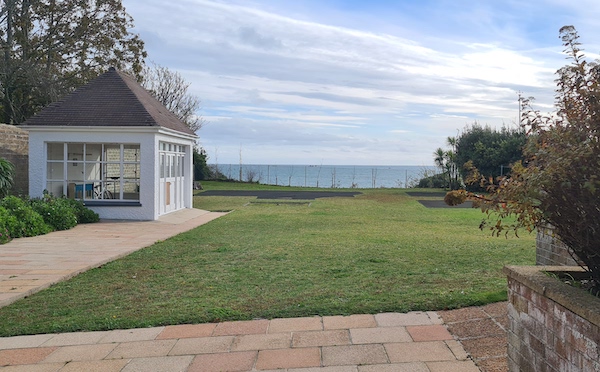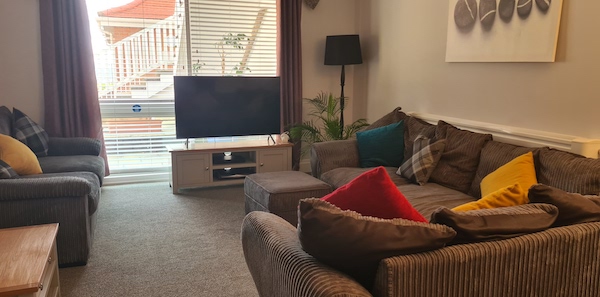


The charity behind a brand new therapeutic facility to help struggling children in Jersey believe its services are being wasted because the Government is refusing to send anyone there.
‘Hope House’ was opened in March by drug and alcohol rehabilitation charity Silkworth in the former Brig-Y-Don children’s home to provide a four-week therapeutic residential programme for young people experiencing emotional distress or struggling with addiction, mental health issues and eating disorders.
While it welcomed several children following referrals from social workers when it first opened, these have since stopped following what the Charity believe was a sudden and unexplained "directive" from Children's Services - leading Silkworth and the Children's Commissioner to now raise the alarm.
Designed as a “family home”, the facility has a total of 11 beds, including two in self-contained flats for the oldest residents. It also includes a large kitchen, dining room and living room, as well as several other rooms that can be used for one-to-one counselling.
There is also a large outside area, with direct access to the beach with the promise of activities such as kayaking, yoga and meditation.

Pictured: Views from the therapeutic ‘Hope House’, which took over the former Brig-Y-Don children’s home.
Up to £240,000 was invested in the project by the charity, which was supported by local community foundations.
Frank Laine MBE and Jason Wyse, the Chairman and CEO of Silkworth respectively, told Express they had identified the need for a facility like ‘Hope House’ following the publication of the Independent Jersey Care Inquiry.
“Hope House provides a unique therapeutic offering on a residential basis that delivers a structured, best practice and evidence-based outcomes for young islanders suffering with mental health problems and other related issues, including working with families and significant others, giving them the skills, hope and structure that they need in order to address their mental health issues,” they said.

Pictured: Hope House is open to young people who are experiencing emotional distress.
“We are committed to working with statutory services in order to ensure that young islanders are given the best choices and hope for long term recovery, which are not always provided within a Government structure.”
Despite Hope House receiving what they described as an initial “flurry of referrals”, they reported that, “as of today, these assisted beds have remained empty as a consequence of a directive from the Directors and Senior Officers within the department, who act as 'Gate Keepers' to this client base.”
Mr Laine and Mr Wyse say they do not know why such a directive would have been issued.
This situation has arisen despite the pair receiving the support of senior officers in Government - including the then-Chief Executive, Charlie Parker, and the Director General of the Children, Young People, Education and Skills (CYPES) Department, Mark Rogers - before the facility opened.
The facility was also fully registered with the island's care regulator, the Jersey Care Commission, and CYPES and the Health Department. It also received endorsement from the Children’s Commissioner, Deborah McMillan.
Following these approvals, Silkworth recruited “a fully professional and therapeutic team and consultants” to deliver the “badly needed service” for young islanders.

Pictured: One of the bedrooms at Hope House.
“Having been able to provide treatment for a number of young islanders that have benefitted from this programme due to the fact that their families have contacted us directly, we have seen and are seeing the true benefits of what this facility can offer the many young islanders that are struggling with their mental health,” Mr Laine and Mr Wyse said.
Their hopes are shared by the Children’s Commissioner, who is now urging the Government to work with the charity.
“I am concerned to hear that Silkworth are reporting that Children’s Services are not referring children to the support service that the charity offers,” Ms McMillan told Express.
She went on to explain that recent research commissioned by her office into advocacy services for children in Jersey echoed Silkworth's concerns about Government staff "gatekeeping referrals."
According to Ms McMillan, the review "concluded that there are historical accounts of professionals in Children’s Services ‘gatekeeping’ and ‘blocking’, or of their own and other services’ staff ‘making bids for children to come to them alone'."

Pictured: The Children’s Commissioner, Deborah McMillan.
“This was evidenced as hindering attempts to offer an advocacy service to children and young people,” she said.
“My strong recommendation to Government is that this practice must not be continued or repeated.”
Ms McMillan also noted that a recent Government-commissioned report by the Independent Children's Homes Association had found that current provisions for children were "not sufficient, incoherent, and inefficiently deployed”, and recommended the creation of a “small bespoke therapeutic home” to provide “intensive work with young people at risk of being secured on welfare grounds."
At the time, the Government said it accepted the £31,000 report's recommendations.

Pictured: The team at Silkworth wanted 'Hope House' to feel like a family home.
“If that is a recommendation accepted by the Minister, then surely Government should be working with Silkworth and Hope House to provide a nurturing, therapeutic environment for our children who need support in a residential setting," the Children's Commissioner said.
Express asked the Government why referrals to Hope House had stopped and whether the decision was a permanent one.
They did not respond to the questions, but instead provided a general statement from Education Minister Deputy Scott Wickenden.
“I know that my officials are working tirelessly on ensuring that we have, or introduce, a sufficient range of suitable, high quality provision for children and young people, especially for those who need specialised and appropriate residential support," he said.
"It is in this context that discussions with Hope House are ongoing."
In recent correspondence to the Children’s Commissioner, Interim CEO Paul Martin indicated that the Government was moving away from residential care as an option for children with emotional and behavioural difficulties.
He said the Government was currently developing an “intensive support service for young people considered to be the most vulnerable, at risk or a risk to others”, which would be “an alternative to care”.

Pictured: The Minister for Children and Education, Deputy Scott Wickenden.
Led by Director of Safeguarding and Care Mark Owers, the service will also aim to prevent placements off-island or support a return from off-island, as well as “reducing the unnecessary use of youth custody and secure care.”
The overall objective would be to “support and maintain young people in the community as an alternative to residential care”, while also increasing the safety of young people and the public, reducing youth crime and anti-social behaviour and the high number of children going missing from care homes.
Each child there would have a care plan, and given educational and emotional support over seven days a week.
“Many will have significant gaps in learning, have learning difficulties and need significant support to get back into education and achieve. It is anticipated that if a child is attending a mainstream school they will continue to attend and that placements at this service should aim to be short or medium-term,” Mr Martin explained.

Pictured: Key figures in Children's Services - Susan Devlin (Group Director of Commissioning and Transforming - Children’s Services), CYPES Director General (Mark Rogers), Director of Safeguarding (Mark Owers).
He said that the service would need a building with a mix of rooms to allow for appropriate timetabling of lessons, therapeutic activity and recreation, as well as space for meals and practical facilities like showers and a washing machine.
There will be “coaches” who work with the young people in a “motivational” way and take on a “befriending” role, acting as a “positive, reliable adult role model.” Outreach and “streetwork” will also form part of the service.
Mr Martin said that the service would be aimed at children aged 11 and above, though they anticipated the majority of children would be 14 to 17 years old.
Express understands the Government is in the process of acquiring a bungalow for this purpose.
While Children's Services are not currently referring children for therapeutic care at Hope House, Mr Laine and Mr Wyse emphasised that they were still happy to take private referrals and can be contacted directly by any families of children needing help.
"...We want to ensure that islanders are aware that there is a route directly to us and we are in hope that a clear pathway can be developed with Government to widen access to this facility."
Express spoke to Silkworth CEO Jason Wyse about his concerns that Government 'gatekeeping' is stopping the island's most vulnerable children access the best quality therapeutic care...
Subscribe to Bailiwick Podcasts on Spotify, Apple Podcasts, Deezer or Whooshkaa.
Comments
Comments on this story express the views of the commentator only, not Bailiwick Publishing. We are unable to guarantee the accuracy of any of those comments.